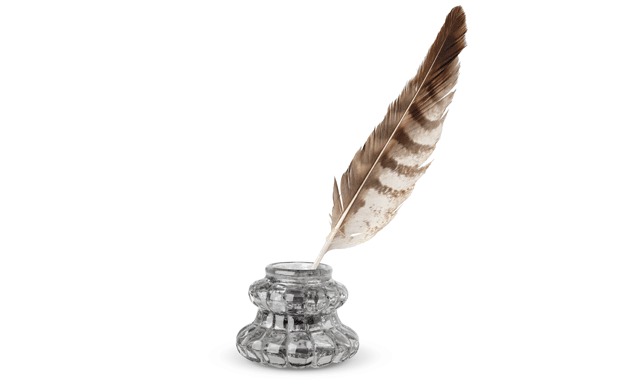While Dickens chose to remain on the lucrative path of a successful novelist instead of working as a less-respectable playwright, his novels have been widely adapted for the stage over the years, and we have welcomed many of these productions to Darlington.
BRANSBY WILLIAMS
Bransby Williams (1870-1961) was born the year Charles Dickens died and was possibly the earliest one-man Dickens performer of major importance.
He became a star of the British music hall, but began his career on the legitimate stage. At the height of his career he was a top line ‘turn’ with an act that included imitations of the great thespians of the day including Henry Irving and Charles Wyndham.
With a repertoire of Dickens characters, interpreted using a replica of the novelist’s reading desk, he was in great demand and sometimes performed several shows at different theatres in one night, notoriously changing costume in the cab while in transit. In the main he focussed on The Pickwick Papers, Dombey and Son, A Tale of Two Cities and 'The Signal-Man'. He appeared on stages all over Britain, broadcast on radio and television, visited the USA and made gramophone recordings. He also starred in the first Dickens sound film as the title character in Grandfather Smallweed, based on episodes from Bleak House.
Various surviving accounts (including his biography published in 1954) suggest that early in his working life he was an all-purpose actor and mimic, making a living largely from work with a provincial stock company, doing musical monologues, imitations of famous actors and characters from Shakespeare and Dickens. These characters were immediately recognised by his audiences, who clearly relished his impersonations. This tells us a great deal about Dickens’ enduring place in British culture. The fact is that Dickens had entered popular consciousness, and remained there long before radio, film and television rendered his writing accessible to a mass audience.
Bransby Williams appeared in Darlington at the New Hippodrome in a week-long star variety production from Monday 17 September 1934. Billed as The World Famous Character Actor, he would have performed twice nightly during the week with performances beginning at 6.40pm and 8.45pm.
A CHRISTMAS CAROL, 1966
In 1966 Michael Fabian Enterprises brought a tour of A Christmas Carol to the Civic Theatre which ran from 12 to 17 December, featuring Margaret Lawson as Miss Fezziwig and Peter Bennett as Scrooge. The production - and Peter Bennett in particular - was a huge hit with The Northern Echo with the reviewer stating: Scrooge himself is unforgettable, not only because of his monopoly of the stage, but because of Peter Bennett’s interpretation of the role. He was forceful, and produced the necessary harsh croak in his voice to create a miserly effect. The part was acted in all the tones of the period and his was an impressive performance. The main characters were well supported by a cast who spoke fluently and with conviction.
A TALE OF TWO CITIES, 1988
A Tale of Two Cities first came to Darlington in 1988 with a joint production from the Cambridge Theatre Company and Tyne Theatre Company which ran at the Civic Theatre from 26 September to 1 October. Steve Pratt of The Northern Echo was moved to say in his review: Directors Jane Gibson and Sue Lefton make magnificent use of music, movement, sound and lighting to convey an atmosphere of a country and people in turmoil – a device that has the added effect of seamlessly joining the necessarily short dramatic scenes conveying the narrative.
The cast included a young Philip Middlemiss who went on to play Des Barnes in Coronation Street for eight years, and Pauline Black of the band Selector.
Oliver!, 1993 AND 2007
Our local amateur theatre company, Darlington Operatic Society, presented a 10- night run of the Lionel Bart classic musical Oliver! - based, of course, on Oliver Twist in October 1993 and again 14 years later in April 2007. Always a hit with audiences due to the sheer number of child performers required in the piece, Oliver! was an artistic and financial success for the company on both occasions. Several of the young performers in these productions have since gone on to forge a career in the performing arts, most notably Peter McGovern who has worked extensively for the Royal Shakespeare Company as well as touring in productions such as The History Boys and The Madness of George III, Jamie Heward who now studies at Urdang in London, Theo Close who attended the BRIT School and who is currently studying at Arts Ed., Stuart Thompson who attended Arts Ed. and now is a student at the London Academy of Music and Dramatic Art and Elliot Allinson – who played the lead role of Oliver - who attended and now works for the Sylvia Young Theatre School.
GREAT EXPECTATIONS, 2012
Beckman Unicorn Productions brought Great Expectations to Darlington from 16 to 20 October 2012. The production, starring Jack Ellis, Chris Ellison, and Paula Wilcox, went on to be the first full-scale adaptation of the piece ever to be seen in the West End when it opened in London the following year. Again The Northern Echo was suitably impressed, with the reviewer observing: Towering, terrifying and touching, this stage adaptation of the novel by Charles Dickens may be the most compelling piece of theatre Darlington audiences will see this season. Beautifully staged, wonderfully acted, this is a production not to be missed.
THE SIGNALMAN, 2015
In October 2015 Middleground Theatre Company presented a thriller double bill which alongside Robert Aickman’s The Waiting Room included an adaptation of Dickens’ classic ghost story ‘The Signal-Man’, starring TV favourite Jack Shepherd. The Signalman is based on Dickens’ short story which draws on his experience of a railway disaster in Staplehurst, Kent. The Northern Echo reviewer Sue Heath wrote: The Signalman is a fully-formed, satisfying tale of the supernatural. The set that greets the audience is an eerie scene with a train tunnel complete with rails that stretch in greenish light back into profound darkness. By contrast the signalman’s room is well-lit and cosy and he is happy to share a hot drink with someone billed as the Traveller, telling him of his experiences on the railway. There’s something on his mind, though, and the sense of dread increases as he goes about his duties. Are his visions due to long hours of loneliness, or a premonition of impending disaster? The excellent Jack Shepherd takes the principal role very ably supported by Richard Walsh as the Traveller. Wonderful actors both, a pleasure to watch.
Dickens in Darlington - Dickens Productions in Darlington
Friday January 6, 2017

